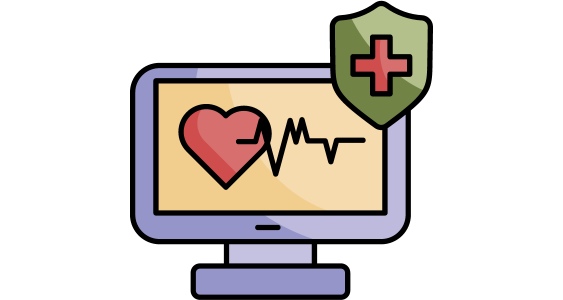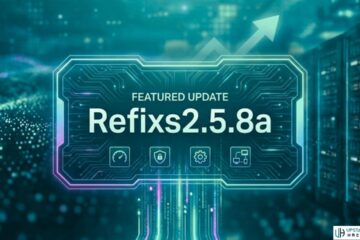Role of AI in EHR Systems
Incorporating AI into Electronic Health Records, commonly known as AI in EHR, revolutionizes the healthcare sector. AI tools like NLP, image recognition, and smart input suggestions enhance diagnostic precision and predict potential complications. EHR software development with AI boosts operational efficiency, simplifying patient record management.
Through machine learning, AI holds tremendous potential in transforming Electronic Medical Records. Its ability to analyze extensive medical records and data pools can significantly improve patient care quality. It allows institutions to reduce care costs and bolster administrative and clinical operations.
In 2023, the healthcare AI market was valued at around $14 billion, with projections indicating an increase to $102.7 billion by 2028, demonstrating a Compound Annual Growth Rate (CAGR) of 47.6%. This growth is primarily fueled by the need to refine complex EHR workflows and extract insights from historical patient data.
Key Benefits of AI in Healthcare
Traditionally, a time-intensive and costly drug development can be expedited using AI. Machine learning models identify molecular structure and image patterns, accelerating drug discovery.
AI enhances the analysis of medical imaging. It aids in the monitoring and treatment of various diseases. These powered imaging models aim to refine clinical care. For instance, companies like Nuance and Microsoft have already integrated AI into EHR solutions.

One of the most groundbreaking aspects of AI is the provision of rapid and precise data. Machine learning algorithms enable clinicians to access more accurate information swiftly. This capability allows for more effective, data-driven decision-making in clinical settings.
AI-Enhanced Electronic Health Record Applications
AI in EHR revolutionizes patient by streamlining data entry. It ensures quick access to relevant patient information. This enhancement can elevate the efficiency of medical staff. It also significantly reduces the costs associated with patient data handling.
AI-integrated EHRs equip physicians with critical diagnostic insights, drawing from symptoms, medical images, and lab results. These intelligent diagnostic aids with the identification of diseases and potential side effects. It helps discover factors impacting health conditions, leading to more accurate treatment decisions.
AI algorithms are pivotal in identifying trends in symptoms and test outcomes. They can even predict patient responses. This data-driven approach allows for tailored treatment plans, ensuring cutting-edge patient care.
Essential Features of Advanced AI-Powered EHR Systems
Custom EHR solutions vary, but there are key features often sought after in healthcare IT:
- Natural Language Processing (NLP). Enables medical staff to dictate patient information. It’s then converted into clinical notes by NLP, saving time for healthcare providers.
- Clinical Data Extraction. Optical character recognition extracts data from various texts (like clinical notes). AI in EHR processes and integrates it with medical coding systems such as ICD-10 and SNOMED CT.
- Text-to-Speech Functionality. An AI assistant can vocalize patient records, facilitating quick access and review by physicians. This feature also assists in double-checking data entries for accuracy.
- Built-in AI Suggestions. AI enhances EHR usability with features like:
- autocomplete for clinical terms;
- autofill for patient information;
- the side panel displays relevant patient history details.
- Diagnostic Functionality. AI in EHR systems can color-code lab results and interpret medical images. They can identify possible diagnoses and alert physicians about high-risk conditions.
- Physician Decision Support. AI aids in care planning by offering personalized treatment options. It can calculate medication dosages and recommend extra tests for comprehensive patient care.
- Telemedicine Appointment Planning. In telemedicine-enabled EHRs, AI assists with scheduling. The program notifies patients of upcoming appointments via patient apps.
- Billing and Insurance Processing. AI handles structured and unstructured care data to determine accurate billing information and create detailed reports. It can also conduct patient eligibility checks and insurance verifications.
Overcoming AI Implementation Challenges in EHR Systems

AI in EHR offers immense benefits to healthcare organizations, such as improved medical staff performance and cost-effective care. Here’s the overview of the most common issues and recommendations to overcome them.
Biased Data Sets in ML Models
Biased training data sets in machine learning can result in skewed treatment or diagnostic outcomes.
Domain-knowledgeable data scientists must validate the quality of training data sets for EHRs. Rigorous testing of ready-made data sets is essential to ensure ML model reliability.
If high-quality data is scarce, creating new sets from anonymized patient data is better. For enhanced accuracy in diagnostic or prescriptive AI tools, consider these strategies:
- Using diverse data sets that reflect societal composition;
- Focusing on a specific demographic, such as geriatric patients in a particular region.
Mitigating Security Risks in EHR Systems
EHRs, being technology-dense and interconnected, are vulnerable to data security threats.
Developing AI-integrated EHRs requires a comprehensive cybersecurity strategy from inception. Your EHR system must adhere to regulatory requirements.
Employing secure development practices and performing consistent security testing is also crucial.
Integrating AI with Existing EHR Platforms
Incorporating AI into current EHR systems might impact performance or cause operational disruptions.
Does your institution have existing EHRs and want to adopt artificial intelligence? Consider creating a standalone AI module and integrating it with the current EHR.
Yet, checking that the current EHR supports extra AI features without hindering performance is advisable.
Conclusion
Artificial Intelligence is bringing in a new era for EHR software and healthcare. EHR platforms are becoming more efficient and precise by harnessing natural language processing and predictive analytics.
As AI in EHR advances, we expect more patient outcomes and healthcare delivery enhancements. The future of EHR software is bright, with AI increasingly integrating with healthcare evolution.
See Also: Breaking Down Barriers: Raising Awareness About Congenital Heart Defects










